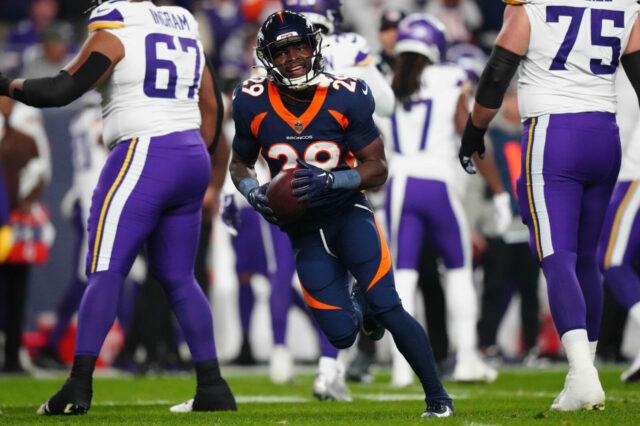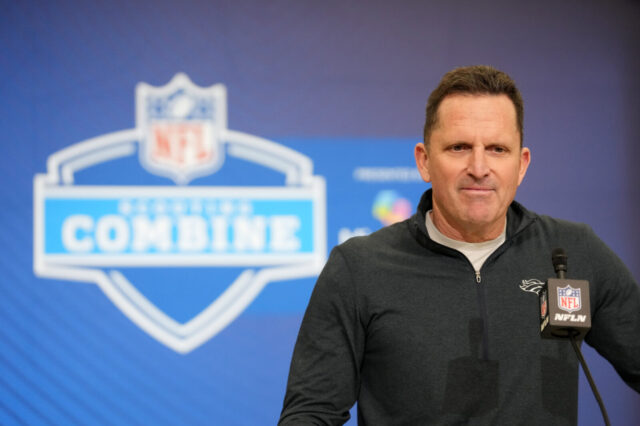It was a lopsided as the 43-16 score might have suggested. Maybe worse.
Just in case you were wondering, just in case some hope (delusion?) had crept in, the reality isn’t pretty: The Denver Broncos and Kansas City Chiefs are miles apart; many, many more than the 645 of them that separate Arrowhead Stadium and Empower Field. Worlds apart feels more accurate.
The Chiefs have now beaten the Broncos 10 consecutive times, make it six in a row in “Mile High,” a place that used to serve as an equalizer if and when the Broncos were undermanned. And most teams that called Mile High home were never this undermanned. Calling the here and now Broncos “undermanned” is generous, and the deficiencies go far beyond the roster itself.
“Our whole team just got beat by them; they’re really good,” surmised Vic Fangio after the game.
Garett Bolles had a different take, saying the Bronco are “neck and neck” with the NFL’s elite. Bolles has personally had an excellent season, and you can’t blame an athlete for staying confident, but anyone who knows what the Denver Broncos are supposed to look like – and have looked like for the better part of their six-decade existence – will respectfully disagree with the young left tackle.
Was Sunday rock bottom?
That might not be fair. The Chiefs are damn good – it’s not as if they don’t beat other teams in similar fashion. Whether Sunday’s loss to the Chiefs was rock bottom in Denver is debatable and perhaps even irrelevant. But 10 straight losses to a team the Broncos beat seven times in a row not all that long ago is a disturbing and telling trend. Ten in a row isn’t about fixing little mistakes, or eliminating “self-inflicted” bad breaks, as Pro Bowl safety Justin Simmons suggested following the game. Ten games in a row says one thing, and it’s nothing that anyone in Denver wants to hear.
The Chiefs have become a better organization.
There are many aspects to any football franchise, successful or not, but if one really boils it down, there are three things that really, really matter. Three things – any of which has the ability to snap a 10-game losing streak – that are typically marks of a great organization.
Quarterback. Coach. Owner.
It’s no knock on Drew Lock to say he was outclassed in the snow by a quarterback who might be the best one to come around since Peyton and Tom. But with Patrick Mahomes under contract until 2031, does anything feel more helpless? Lock might be adequate or even better than that – and that would be fine – so long as the other two keys are present.
Is Vic Fangio a good head coach? Or can he become one? There’s no doubt he’s a brilliant defensive mind; his version of the Orange Crush was – all things considered – respectable against the Chiefs. Kansas City’s 46 points is misleading, considering that there was a defensive touchdown, costly turnovers in the wrong end of the field, and horrific special teams play all day long. When everything goes awry, the guy at the top, no matter what he’s good at, gets the blame.
Which begs the question: Can Fangio’s knowledge of defense ever evolve into something just a little bit bigger? Can he become a “CEO type” – like Mike Shanahan, Gary Kubiak or even Andy Reid, who just notched his 213th regular season win, tying Paul Brown for sixth on the NFL’s all-time win list?
We can’t expect Fangio, 62, to catch Reid, but it’s probably fair to ask that the Broncos narrow the gap and even steal one from time to time. In his three meetings with the Chiefs, the Broncos have been beaten by an average of 24 points. The Chiefs are significantly better than they were before Mahomes took over at quarterback, but for the sake of comparison, even Vance Joseph’s teams only lost to the Chiefs by an average of six points. Again, that’s a trend going in the wrong direction.
To some extent, however, quarterbacks and coaches come and go. Whether by injury, demotion or termination, either of those key positions can change in the blink of an eye.
What can’t change is the standard.
No organization – sports, business, whatever – always achieves the standard. Goals are meant to be chased, so it’s impossible to live up to a championship standard 100 percent of the time. But great organizations flirt with it all the time, they focus on it all the time and they’re never realistically that far from being able to achieve it.
That’s where ownership comes in. And in the case of the Broncos, there isn’t any.
Pat Bowlen fired longtime friend and Super Bowl-winning coach Mike Shanahan, one of the then-rare coaches who also held duties as a general manager, for one reason and one reason only. Shanahan had failed to meet Mr. B’s standard one too many times. Shanahan didn’t get canned because, since 1998, he hadn’t won a Super Bowl, the Broncos annual stated goal. But it turns out that three-consecutive seasons without a playoff berth did the trick.
Bowlen also whacked wizkid coordinator (sort of) turned head coach and GM almost as fast as he’d hired him. Again, McDaniels failed at meeting the standard and Mr. B was quick to pull the trigger.
The Denver Broncos might have leaders in place, but it’s not quite as clear cut as it once was. There’s not a single, “buck-stops-here” person like Mr. B in place. And what even more clear, is that the within the cumulative, fuzzy role of leadership, there’s not a single person who’s insisting on the type of standard that cost Shanahan and McDaniels their jobs.
What the Chiefs have built, conversely, is living breathing proof that Clark Hunt has demanded the same standard that Pat Bowlen so valued.
Quarterback. Coach. Owner. The greatest teams have all three. Teams that have a shot more than likely have two of the three.
Ask yourself this: Of the three positions, are the Broncos better or equal to the Chiefs in any one of them?
When you’re 0-for-3 there, you get 43-16 at home.
Or even worse, 0-for-10 since November 2015.



